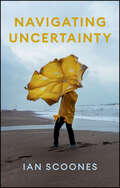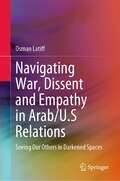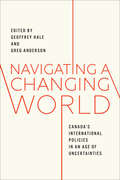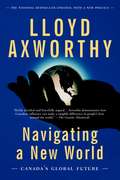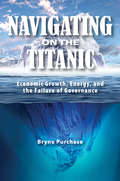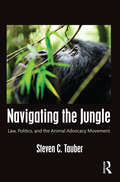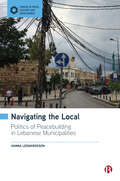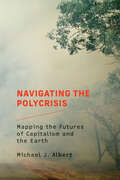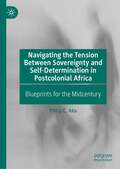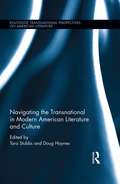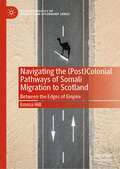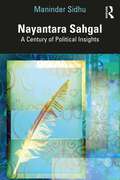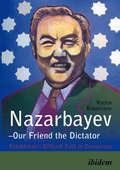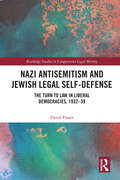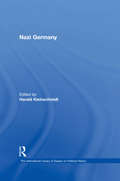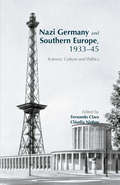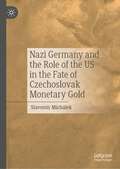- Table View
- List View
Navigating Uncertainty: Radical Rethinking for a Turbulent World
by Ian ScoonesUncertainties are everywhere. Whether it’s climate change, financial volatility, pandemic outbreaks or new technologies, we don’t know what the future will hold. For many contemporary challenges, navigating uncertainty – where we cannot predict what may happen – is essential and, as the book explores, this is much more than just managing risk. But how is this done, and what can we learn from different contexts about responding to and living with uncertainty? Indeed, what might it mean to live from uncertainty?Drawing on experiences from across the world, the chapters in this book explore finance and banking, technology regulation, critical infrastructures, pandemics, natural disasters and climate change. Each chapter contrasts an approach centred on risk and control, where we assume we know about and can manage the future, with one that is more flexible, responding to uncertainty. The book argues that we need to adjust our modernist, controlling view and to develop new approaches, including some reclaimed and adapted from previous times or different cultures. This requires a radical rethinking of policies, institutions and practices for successfully navigating uncertainties in an increasingly turbulent world.
Navigating War, Dissent and Empathy in Arab/U.S Relations: Seeing Our Others in Darkened Spaces
by Osman LatiffThis book focuses on American political discourse connected to war, dissent, and empathy. Through interdisciplinary methods of history, politics and media studies, the book examines ways in which American self-identity alters as a consequence of media portrayal of human suffering and of its existential others. It compares representations of the Iraq wars to earlier precedents and looks at the work of American activists, assessing how narratives and images of human suffering in new media iconography generate empathic attitudes towards others. This comparative, multimodal study helps to explain shifting self-identities within the U.S, and relationally through the representation of the Arab other presenting an original and historicised contribution to the media-war field of academic and public debate. The book underscores empathy as a vibrant category of analysis that expands how we think about West-Arab relations, revealing how understanding the cultural aspects of this conflictual interrelationship needs to be broadened.
Navigating a Changing World: Canada's International Policies in an Age of Uncertainties
by Geoffrey Hale, Greg AndersonThe negotiation of the Canada–United StatesU.S. Free Trade Aagreement in 1985–88 initiated a period of substantially increased North American, and later, global, economic integration. However, events since the election of Donald Trump in 2016 have created the potential for major policy shifts arising from NAFTA’s renegotiation and from continuing political uncertainties in the United States and with Canada’s other major trading partners. Navigating a Changing World draws together scholars from both countries to examine Canada–U.S. policy relations, the evolution of various processes for regulating market and human movements across national borders, and the specific application of these dynamics to a cross-section of policy fields with significant implications for Canadian public policy. This bookIt explores the interaction impact of territorial institutions and extra-territorial forces – institutional, economic, and technological, among others – on interactions across national borders, both within North America and, where relevant, in broader economic relationships affecting the movement of goods, services, people, and capital. Above all, Navigating a Changing World represents the first major study to address Canada’s international policy relations within and beyond North America since the elections of Justin Trudeau in 2015 and Donald Trump in 2016 and the renegotiation of NAFTA.
Navigating a New World: Canada's Global Future
by Lloyd AxworthyIn Navigating a New World Lloyd Axworthy charts how we can become active citizens in the demanding world of the twenty-first century, to make it safer, more sustainable and more humane. Throughout he emphasizes the human story. As we meet refugees from civil war and drought, child soldiers and landmine victims, the moral imperative is clear: this is a deeply compassionate appeal to confront poverty, war and environmental disaster.Before Lloyd Axworthy entered global politics, "human security" -- a philosophy calling for global responsibility to the interests of individuals rather than to the interests of the nation state or multi-national corporations -- was a controversial and unfamiliar idea. When put into action, human security led to an international ban on landmines, initiatives to curtail the use of child soldiers, and the formation of the International Criminal Court. Today, with conflict raging across the planet -- and building -- the need for a humane, secure international governance is more vital than ever. So how can Canada reject a world model dominated by U.S. policy, military force and naked self-interest? How can we rethink a global world from the perspective of people -- our security, our needs, our promise, our dreams?Lloyd Axworthy delivers recommendations that are both practical and radical, ranging from staunch Canadian independence from the U.S. to environmental as well as political security; from rules to govern intervention when nations oppress their own citizens, to codes of conduct on arms control and war crimes.Arresting and provocative, Navigating a New World lays out just why Canada has the skills to lead the world into a twenty-first century less nightmarish than the last, and help make the world safer and more just for us all. This is a call for action from one of Canada's most eloquent statesmen and thinkers, and is essential reading for all Canadians.Where is the line we draw in setting out the boundaries for being responsible for others? Is it simply family and close friends? Do we stop at the frontiers of our own country? Does our conscience, our sense of right or wrong, take us as far as the crowded camps of northern Uganda, surrounded by land mines, attacked repeatedly by an army made largely of child soldiers? I believe we in Canada have a special vocation to help in the building of a more secure order. We need not be confined to our self-interest. -- from Navigating a New WorldFrom the Hardcover edition.
Navigating on the Titanic
by Bryne PurchaseNavigating the Titanic outlines the brief history of economic growth and the private and public institutions - markets, corporations, households, and governments - which underpin that growth. Bryne Purchase examines mega-risks related to our economy's use of fossil fuels and specifically looks at resource depletion, energy security, and climate change - all "mega-risks" because they are both global in scope and potentially existential in impact. Focusing on North America, with a particular emphasis on the United States, Purchase's central argument is that the institutions which have produced spectacular economic growth are not capable of acting with prudence to deal with these mega-risks before they become a real danger. He identifies certain institutional design flaws that, while underwriting economic growth, leave society open to potentially catastrophic failure and reveals how these design flaws have been compounded by the stresses of the growing income inequality in society.
Navigating on the Titanic: Economic Growth, Energy, and the Failure of Governance (Queen's Policy Studies Series #306)
by Bryne PurchaseNavigating the Titanic outlines the brief history of economic growth and the private and public institutions - markets, corporations, households, and governments - which underpin that growth. Bryne Purchase examines mega-risks related to our economy's use of fossil fuels and specifically looks at resource depletion, energy security, and climate change - all "mega-risks" because they are both global in scope and potentially existential in impact. Focusing on North America, with a particular emphasis on the United States, Purchase's central argument is that the institutions which have produced spectacular economic growth are not capable of acting with prudence to deal with these mega-risks before they become a real danger. He identifies certain institutional design flaws that, while underwriting economic growth, leave society open to potentially catastrophic failure and reveals how these design flaws have been compounded by the stresses of the growing income inequality in society.
Navigating the Jungle: Law, Politics, and the Animal Advocacy Movement
by Steven C. TauberFor much of our history, legal scholars focused predominantly on the law's implications for human beings, while ignoring how the law influences animal welfare. Since the 1970s, however, there has been a steep increase in animal advocates' use of the courts. Animal law has blossomed into a vibrant academic discipline, with a rich literature that examines how the law affects animal welfare and the ability of humans to advocate on behalf of nonhuman animals. But most animal law literature tends to be doctrinally-based or normative. There has been little empirical study of the outcomes of animal law cases and there has been very little attention paid to the political influences of these outcomes. This book fills the gap in animal law literature. This is the first empirically-based analysis of animal law that emphasizes the political forces that shape animal law outcomes.
Navigating the Local: Politics of Peacebuilding in Lebanese Municipalities
by Hanna LeonardssonHow is peace built at the local level? Covering three Lebanese municipalities with striking sectarian diversity, Saida, Bourj Hammoud and Tyre, this book investigates the ways in which local service delivery, local interactions and vertical relationships matter in building peace. Using the stories and experiences of municipal councillors, employees and civil society actors, it illustrates how local activities and agencies are performed and what it means for local peace in Lebanon. Through its analysis, the book illustrates what the practice of peacebuilding can look like at the local level and the wider lessons - both practical and theoretical - that can be drawn from it.
Navigating the Polycrisis: Mapping the Futures of Capitalism and the Earth
by Michael J. AlbertAn innovative work of realism and utopianism that analyzes the possible futures of the world-system and helps us imagine how we might transition beyond capitalism.The world-system of which we are all a part faces multiple calamities: climate change and mass extinction, the economic and existential threat of AI, the chilling rise of far-right populism, and the invasion of Ukraine, to name only a few. In Navigating the Polycrisis, Michael Albert seeks to illuminate how the &“planetary polycrisis&” will disrupt the global community in the coming decades and how we can best meet these challenges. Albert argues that we must devote more attention to the study of possible futures and adopt transdisciplinary approaches to do so. To provide a new form of critical futures analysis, he offers a theoretical framework—planetary systems thinking—that is informed by complexity theory, world-systems theory, and ecological Marxism. Navigating the Polycrisis builds on existing work on climate futures and the futures of capitalism and makes three main contributions. First, the book brings together modeling projections with critical social theory in a more systematic way than has been done so far. Second, the book shows that in order to grasp the complexity of the planetary polycrisis, we must analyze the convergence of crises encompassing the climate emergency, the structural crisis of global capitalism, net energy decline, food system disruption, pandemic risk, far-right populism, and emerging technological risks (e.g. in the domains of artificial intelligence, biotechnology, and nuclear weapons). And third, the book contributes to existing work on postcapitalist futures by analyzing the processes and mechanisms through which egalitarian transitions beyond capitalism might occur.A much-needed work of global futures studies, Navigating the Polycrisis brings together the rigor of the natural and social sciences and speculative imagination informed by science fiction to forge pathways to our possible global future.
Navigating the Tension Between Sovereignty and Self-Determination in Postcolonial Africa: Blueprints for the Midcentury
by Philip C. AkaThis book addresses the unique challenges faced by Africa regarding peaceful self-determination. Unlike other regions, Africa has seen limited success in nonviolent self-determination campaigns. Since 1989, only three African nations - Namibia, Eritrea, and South Sudan - have joined the UN after enduring prolonged and violent struggles for independence. In a world characterized by constant change, border alterations typically require armed conflicts in postcolonial Africa. In response to this disconcerting trend, the book offers pragmatic blueprints for achieving peace, emphasizing constitutional approaches to navigate the delicate balance between sovereignty and self-determination. The work delves into the complexities of five self-determination struggles spanning three African countries, providing valuable insights into the challenges faced. It distils six critical lessons from these case studies and presents fourteen blueprint proposals tailored to address the unique dynamics of postcolonial Africa, where reconciling sovereignty and self-determination remains a pressing concern.
Navigating the Transnational in Modern American Literature and Culture: Axes of Influence (Routledge Transnational Perspectives on American Literature)
by Tara Stubbs Doug HaynesThis study develops the important work carried out on American literature through the frameworks of transnational, transatlantic, and trans-local studies to ask what happens when these same aspects become intrinsic to the critical narrative. Much cultural criticism since the 1990s has sought to displace perceptions of American exceptionalism with broader notions of Atlanticism, transnationalism, world-system, and trans-localism as each has redefined the US and the world more generally. This collection shows how the remapping of America in terms of global networks, and as a set of particular localities, or even glocalities, now plays out in Americanist scholarship, reflecting on the critical consequences of the spatial turn in American literary and cultural studies. Spanning twentieth and twenty-first century American poetry, fiction, memoir, visual art, publishing, and television, and locating the US in Caribbean, African, Asian, European, and other contexts, this volume argues for a re-modelling of American-ness with the transnational as part of its innate rhetoric. It includes discussions of travel, migration, disease, media, globalization, and countless other examples of inflowing. Essays focus on subjects tracing the contemporary contours of the transnational, such as the role of the US in the rise of the global novel, the impact of Caribbean history on American thought (and vice versa), transatlantic cultural and philosophical genealogies and correspondences, and the exchanges between the poetics of American space and those of other world spaces. Asking questions about the way the American eye has traversed and consumed the objects and cultures of the world, but how that world is resistant, this volume will make an important contribution to American and Transatlantic literary studies.
Navigating the: Between the Edges of Empire (Palgrave Politics of Identity and Citizenship Series)
by Emma HillWhat happens when migration takes place between sites defined by different types of ‘colonial difference’? This book asks this question in the context of Somali migration to Scotland, which it maps over a century of colonial relations, independence movements, and the reorganisation of the (post)colonial Somali and British states. Framing both Somalia and Scotland as sites of marginality in the matrices of colonial power, it tracks through a combination of archival material and contemporary testimonies the operation, development and divergence of (the) colonial(ity of) power in shaping Somali migration and citizenship experiences in Scotland. However, whilst the book has a grounded and localised focus, it makes the argument that Somali-Scottish migration cases present the urgent need for a holistic approach to the operation of coloniality, which not only emanates from the so-called ‘centre’ of Empire, but also at and between its edges.
Nayantara Sahgal: A Century of Political Insights
by Maninder SidhuThis book is a comprehensive critical re-reading of Nayantara Sahgal’s oeuvre. One of the most significant Indian English writers, her fictional and non-fictional engagement with historical events and political dilemmas inextricably links her to the colonial, anti-colonial and post-colonial discourse in India. Drawing transcontinental connections with the ideas of Fanon, Foucault, Said, Beauvoir, White, Beck and Habermas the monograph juxtaposes recurring themes in her writing with the ideas of significant Indian post-colonial commentators. Tracing the subliminal tendencies in her writing to Gandhian humanity and Nehruvian pragmaticism, the book moves beyond clichés of feminist criticism and genealogical ties to unveil a unique artist who has folded nearly a century of Indian experience in her work. Drawing on novels, essays, speeches, journalism and interviews by Nayantara Sahgal, this volume will be of great interest to scholars of South Asian literature, post-colonialism, politics and contemporary history/culture/change.
Nazarbayev—Our Friend the Dictator: Kazakhstan's Difficult Path to Democracy
by Viktor Khrapunov"Like David, I am battling against a Goliath that has almost immeasurable means and powerful allies. I don't think I can win, I just want to be heard. No dictatorship lasts forever, and if my contribution can sooner or later bring about its downfall, then I will have achieved what I set out to do."The man waging this unequal war is Viktor Khrapunov. He used to be mayor of Almaty, Kazakhstan's largest city, and the country's Energy Minister before he was forced into exile. From Switzerland, where he now lives with his family, he brings charges against the rule of Nursultan Nazarbayev, which will soon reach its twenty-fifth year. Nazarbayev, initially welcomed as a young, dynamic president, has become a reckless and unpredictable dictator over the years. From the abusive privatization of the country's mineral resources and thriving corruption to personal intrigues and the stone-cold elimination of political opponents—Khrapunov's account of the criminal wheeling and dealing of this self-styled 'ruler of the nation' tells it how it is. Based on Khrapunov's insider knowledge from the hallways of global power, his story is also a revelation of Western apathy towards a brutal dictatorial regime. This gripping autobiographical narrative helps the reader understand how Kazakhstan has developed politically from the collapse of the Soviet Union to the modern day, and how it can blossom into a democratic state.
Nazi Antisemitism and Jewish Legal Self-Defense: The Turn to Law in Liberal Democracies, 1932–39 (Routledge Studies in Comparative Legal History)
by David FraserOne of the first to provide a socio-legal comparative history of under-studied or ignored Jewish attempts in the 1930s "Anglosphere" to counter the rise in fascist and Nazi antisemitism, this book examines the ways in which Jewish individuals and organized communal bodies in the mid-to-late 1930s sought to counter this increasing antisemitic violence, physical and verbal, by using the law against their fascist and Nazi attackers. This is the first study to explore how Jews in these countries organized themselves, brought their oppressors to court, while seeking to convince their governments that an attack on Jews was a threat to the social order. The book analyzes the networks of knowledge and the personal relationships between and among key actors and institutions of the "Antisemitic International." Nazi "nationalists" always participated in networks that transcended borders. Case studies from Canada, South Africa, the United Kingdom, and the United States, illustrate the ways in which different mechanisms of Jewish resistance were deployed throughout the mid-to-late 1930s. They embody significant concerns about the "turn to law" and the importance of litigation and legislation. Grounded in original archival research on three continents, the book examines the ways in which professional legal discourse about public order and democratic citizenship proffered by Jewish communities and individual Jews was countered by their Nazi opponents with legal and political arguments about "truth," "persecution," and Jewish perfidy. The book will be of interest to students, academics, and researchers working in the areas of Legal History, History, Jewish Studies, the study of Antisemitism, and the History of the far right, fascism and Nazism.
Nazi Bhasmasuracha Udayasta: नाझी भस्मासुराचा उदयास्त
by V. G. Kanitkarनाझी भस्मासुराच्या उदयास्ताचा इतिहास सांगण्याची आवश्यकता अशाकरिता आहे की, या पर्वातील विलक्षण घटनांची ओळख सर्वांनाच झाली पाहिजे. लोकशाही मृत्युशय्येवर कशी जाते? हुकुमशहा सत्तेवर कसे येतात? राजकारणातले यश नेहमीच डागाळलेले का असते? युद्धाने प्रश्न सुटतात का? या व अशा अनेक प्रश्नांची उत्तरे शोधण्यासाठी या इतिहासाची मदत होईल.
Nazi Billionaires: The Dark History of Germany's Wealthiest Dynasties
by David de Jong“A provocative group portrait of five industrialists who expanded their fortunes by colluding with Hitler and then, after World War II, walked away with minimal punishment and barely a dent in their bottom lines... In this meticulously researched book, Mr. de Jong, an investigative journalist and former reporter at Bloomberg News, compels us to confront the current-day legacy of these Nazi ties."—The Wall Street JournalA groundbreaking investigation of how the Nazis helped German tycoons make billions off the horrors of the Third Reich and World War II—and how America allowed them to get away with it.In 1946, Günther Quandt—patriarch of Germany’s most iconic industrial empire, a dynasty that today controls BMW—was arrested for suspected Nazi collaboration. Quandt claimed that he had been forced to join the party by his archrival, propaganda minister Joseph Goebbels, and the courts acquitted him. But Quandt lied. And his heirs, and those of other Nazi billionaires, have only grown wealthier in the generations since, while their reckoning with this dark past remains incomplete at best. Many of them continue to control swaths of the world economy, owning iconic brands whose products blanket the globe. The brutal legacy of the dynasties that dominated Daimler-Benz, cofounded Allianz, and still control Porsche, Volkswagen, and BMW has remained hidden in plain sight—until now.In this landmark work of investigative journalism, David de Jong reveals the true story of how Germany’s wealthiest business dynasties amassed untold money and power by abetting the atrocities of the Third Reich. Using a wealth of untapped sources, de Jong shows how these tycoons seized Jewish businesses, procured slave laborers, and ramped up weapons production to equip Hitler’s army as Europe burned around them. Most shocking of all, de Jong exposes how America’s political expediency enabled these billionaires to get away with their crimes, covering up a bloodstain that defiles the German and global economy to this day.
Nazi Exhibition Design and Modernism
by Michael TymkiwA new and challenging perspective on Nazi exhibition design In one of the most comprehensive analyses ever written on the subject, Michael Tymkiw reassesses the relationship between Nazi exhibition design and modernism. While National Socialist exhibitions are widely understood as platforms for attacking modern art, they also served as sites of surprising formal experimentation among artists, architects, and others, who often drew upon and reconfigured the practices and principles of modernism when designing exhibition spaces and the objects within. In this book, Tymkiw reveals that a central motivation behind such experimentation was the interest in provoking what he calls "engaged spectatorship"—attempts to elicit experiences among exhibition-goers that would pique their desire to become involved in wider processes of social and political change. For historians of art, architecture, performance, and other forms of visual culture, Nazi Exhibition Design and Modernism unravels long-held assumptions, particularly concerning the ideological stakes of participation.
Nazi Fugitive: The True Story of a German on the Run
by David Talbot Eugen DollmannAn SS colonel goes underground at the end of WWII Eugen Dollmann was a scholar and member of the SS whose connections among Italian society led to a posting as a liaison officer attached to Mussolini during World War II. In his work as a diplomat and interpreter, he associated with Heydrich, Himmler, and Hitler. This memoir begins with the surrender of the Germans in 1945 and relates how after Dollmann escaped from the British, a Roman Catholic cardinal helped him by allowing him to hide in a home for drug addicts. Later, Dollmann was provided with false papers by the CIA who enlisted him for the fight against communism. After he was arrested by the Italian police, the Americans had no alternative but to jail him, and after some months he was transferred to a camp near Frankfurt for ?outstanding cases,” where some of the prominent Nazis were held. Dollmann was released, but he decided to get back to Italy across the frontiers, which he succeeded in doing only after a series of varied escapades.Nazi Fugitive is a remarkable story of a former enemy turned ally during the early years of the Cold War.
Nazi Germany (The International Library of Essays on Political History)
by Harald KleinschmidtThe volume reproduces a set of recently-published articles demonstrating the embeddedness of Nazi genocide and other crimes against humanity in a German society that was haunted by practices of denunciation. Far from being an inexplicable invasion of evil into otherwise sound German society, the genocide and other crimes against humanity were committed not merely by members of SS organizations but by common people, civilians and military men alike, within Germany as well as in occupied territories, during the late 1930s and World War II. Although analyzing the past, the book also seeks contribute to current debates on the causes of genocide and other crimes against humanity.
Nazi Germany and Southern Europe, 1933-45: Science, Culture and Politics
by Fernando Clara Cláudia Ninhos Sasha GrishinNazi Germany and Southern Europe, 1933-45 is about transnational fascist discourse. It addresses the cultural and scientific links between Nazi Germany and Southern Europe focusing on a hybrid international environment and an intricate set of objects that include individual, social, cultural or scientific networks and events.
Nazi Germany and the Arab World
by Francis R. Nicosia"This book considers the evolving strategic interests and foreign policy intent of the Third Reich toward the Arabic-speaking world, from Hitler's assumption of power in January 1933 to 1944, a year following the final Axis defeat in and expulsion from North Africa in May 1943. It does so within the context of two central, interconnected issues in the larger history of National Socialism and the Third Reich, namely Nazi geopolitical interests and ambitions and the regime's racial ideology and policy. This book defines the relatively limited geopolitical interests of Nazi Germany in the Middle East and North Africa within the context of its relationships with the other European great powers and its policies with regard to the Arabs and Jews who lived in those areas"--
Nazi Germany and the Role of the US in the Fate of Czechoslovak Monetary Gold
by Slavomír MichálekThis book provides a detailed account of the Czechoslovak-American dispute that arose over monetary gold which was forcibly seized by Nazi Germany in the 1930s. After the Second World War, the Czechoslovak gold was found by the American armed forces in the salt mines in Merkers, Germany. Over the next 37 years, it became a part of complicated Czechoslovak-American relations, international economic trade, and political-ideological disputes and conflicts. Only in February 1982, after extensive diplomatic discussions, was a sufficient portion of the gold returned to the Czechoslovak State Bank in Prague. This book maps the story of this gold, how it was seized, blocked and finally, returned. Tracing the path of the monetary gold from its seizure by Nazi Germany in the 1930s to the last decade of the Cold War, the author outlines the main diplomatic steps taken to resolve the dispute, which framed the shape of bilateral relations between Communist Czechoslovakia and the USA. Offering a new contribution to the hisThis book provides a detailed account of the Czechoslovak-American dispute that arose over monetary gold which was forcibly seized by Nazi Germany in the 1930s. After the Second World War, the Czechoslovak gold was found by the American armed forces in the salt mines in Merkers, Germany. Over the next 37 years, it became a part of complicated Czechoslovak-American relations, international economic trade, and political-ideological disputes and conflicts. Only in February 1982, after extensive diplomatic discussions, was a sufficient portion of the gold returned to the Czechoslovak State Bank in Prague. This book maps the story of this gold, how it was seized, blocked and finally, returned. Tracing the path of the monetary gold from its seizure by Nazi Germany in the 1930s to the last decade of the Cold War, the author outlines the main diplomatic steps taken to resolve the dispute, which framed the shape of bilateral relations between Communist Czechoslovakia and the USA. Offering a new contribution to the history of the Second World War and shedding light on East-West relations during the Cold War period, this book will provide useful reading for those researching modern European history, the Cold War, and international history.
Nazi Hunter: The Wiesenthal File
by Alan LevySimon Wiesenthal spent four and a half years in Mauthausen concentration camp during World War II. With the exception of his wife, all his immediate family were exterminated, and he himself ended the war a living skeleton. Since then, he has achieved international reknown for his tireless and successful tracking down of Nazi war criminals, including notorious figures such as Eichmann, the 'desk murderer' who masterminded Hitler's Final Solution; Stangl the overlord of Treblinka; and the Mengele of Auschwitz, the dreaded 'Angel of Death'. To this day his work continues, his motivation simply expressed in the words: 'Justice, not vengeance'. This work provides an account of Wiesenthal's inspired detective work.
Nazi Hunter: The Wiesenthal File
by Alan LevySimon Wiesenthal spent four and a half years in Mauthausen concentration camp during World War II. With the exception of his wife, all his immediate family were exterminated, and he himself ended the war a living skeleton. Since then, he has achieved international reknown for his tireless and successful tracking down of Nazi war criminals, including notorious figures such as Eichmann, the 'desk murderer' who masterminded Hitler's Final Solution; Stangl the overlord of Treblinka; and the Mengele of Auschwitz, the dreaded 'Angel of Death'. To this day his work continues, his motivation simply expressed in the words: 'Justice, not vengeance'. This work provides an account of Wiesenthal's inspired detective work.
